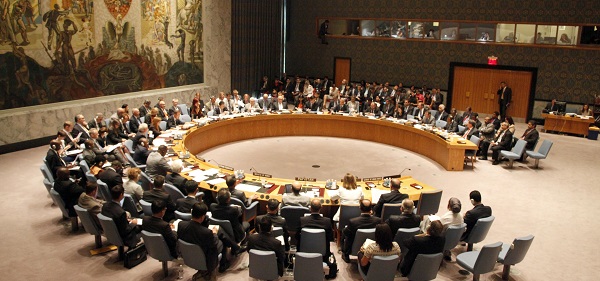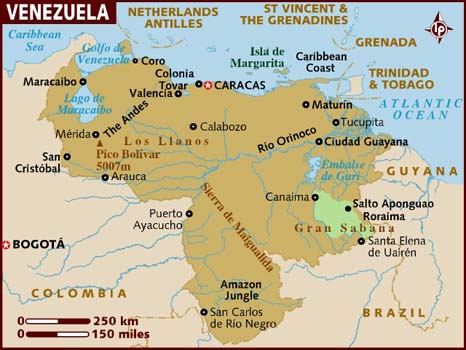UNSC in a gridlock over Venezuela
March 2, 2019 | Expert Insights

Russia and China vetoed a US resolution on Venezuela at the United Nations Security Council, expressing concerns over external interference in affairs of a sovereign state. A Russian draft also failed to find consensus.
Background
From 1948-1958 Venezuela was under military dictatorship. 23rd January marks the day a civilian-military movement overthrew the government of Gen. Marcos Pérez Jiménez in Venezuela. Gen. Marcos Pérez Jiménez was feared and hated in his country while mocked as the prototype of the Latin American military despot. During his reign, government spending on education and health was slashed, and the earnings from oil sales were diverted into lavish, costly and superfluous construction projects.
Nicolas Maduro took office in 2013. Under his leadership, there has been a spike in inflation and a shortage of goods. A drop in oil prices has added to the administration’s problems. He has retained power by weakening institutions and rigging elections. He has been accused of committing serious human rights abuses and engaging in rampant corruption. Despite having the world's largest proven oil deposits, many Venezuelans are living in abject poverty. The UN says 1.6 million Venezuelans have fled the country since the economic meltdown in 2015. Venezuela’s economy has contracted by 35 per cent since 2013, much larger than the one experienced by the USA during the Great Depression in the 1930s.
On January 23, US President Donald Trump recognised Juan Guaido as the ‘legitimate’ President of Venezuela. In retaliation, Nicolas Maduro severed all diplomatic ties with Washington and asked all US diplomatic staff to leave within 72 hours.

Analysis
Russia’s envoy to the UN Vassily Nebenzia slammed the US resolution as “the culmination of the American show of double standards regarding Venezuela.” He insisted that the US knew from the start that its proposal had no chance of being approved and was only conjectured to justify complaints that the supply of humanitarian aid into Venezuela was denied. “We have serious concerns that today’s [UNSC] meeting may be used as a step in preparing an actual, not humanitarian, intervention into Venezuela,” the envoy said.
The US draft blamed the government of President Nicolas Maduro for causing an “economic collapse” in Venezuela, which has sparked a migrant and refugee crisis. Referring to the authorities in Caracas as the “regime,” the document urged to “start a peaceful political process” that would result in “free, fair and credible presidential elections,” while denouncing the May presidential vote as “neither free, nor fair.”
Speaking at the UNSC, US Special Representative for Venezuela Elliott Abrams, accused those who opposed the US-sponsored draft for standing with Maduro at the expense of the Venezuelan people. “By voting against this resolution, some members of the council continue to shield Maduro and his cronies and prolong the suffering of Venezuelan people,” Abrams said. Washington would not give up on its attempts to push for a “peaceful transition to democracy” in Venezuela and deliver ‘humanitarian’ aid to the crisis-hit country, Abrams said.
The Venezuelan authorities believe the aid deliveries initiated by the US, to be a cover for supporting a coup or preparing grounds for intervention – a tactic Abrams has used elsewhere, for example in Nicaragua, in the 1980s.
The US-proposed resolution is "seriously inconsistent" with China's position, Beijing's envoy said, voting against it. "Venezuelan affairs should be decided by the Venezuelan people," Wu Haitao explained the decision. "China opposes external forces interfering in Venezuelan internal affairs and opposes military intervention in Venezuela.”
The US draft resolution garnered nine votes, while Russia, China and South Africa voted against the text. Indonesia, Equatorial Guinea and Ivory Coast abstained. The council then voted on the Russian draft supporting a political solution, which failed with seven votes against it. A "no" vote by any one of the five permanent members – US, UK, France, Russia and China – is considered a veto, killing the proposal automatically.
The Russian draft suggested that the Security Council should express concern over civilian deaths in Venezuela and urge all political forces there to commit to resolving the situation.
The draft was similar to a joint statement on the violence in Haiti, which the US supported a few days ago. But when it came to Venezuela, the Americans “killed off” the Russian proposal by adding remarks condemning the government of Nicolas Maduro and making other changes, said Dmitry Polyansky, the Russian deputy UN envoy.
Assessment
Our assessment is that only a multilateral agreement with Venezuela has any chance of success in the UNSC as the veto power will prevent any one-sided resolution from passing. We believe that any resolution will succeed if the incumbent Maduro government agrees with the provisions.
Read more:








Comments